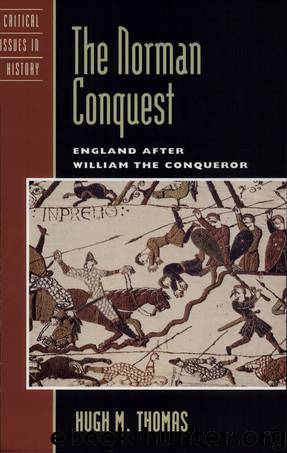The Norman Conquest: England After William the Conqueror by Hugh M. Thomas

Author:Hugh M. Thomas [Thomas, Hugh M.]
Language: eng
Format: epub
Tags: History, Europe, Western, France, Great Britain
ISBN: 9780742538405
Google: -9w69IC0JFwC
Amazon: 0742538400
Publisher: Rowman & Littlefield
Published: 2007-10-15T07:00:00+00:00
LAW AND THE LEGAL SYSTEM
Because Anglo-Saxon law seems so different from the common law of England that began emerging in the twelfth century, it is easy to imagine that the Normans must have radically changed the legal system. The Normans themselves claimed otherwise. William I and his son Henry both promised to maintain the “Law of Edward,” their name for the laws that were in practice when Edward the Confessor died. Sources from after the conquest reveal the Normans consulting with English experts on law. For instance, William himself had Aegelric, an aged bishop “wise in the law of the land,” brought by wagon to testify in an important lawsuit between Archbishop Lanfranc and the king’s half brother, Bishop Odo of Bayeux.72 Moreover, many Anglo-Saxon law codes were copied and studied after 1066, and a compilation describing the laws in practice under Henry I, containing much Anglo-Saxon law, was written by an anonymous French-speaking student of Anglo-Saxon law.73
Only recently has law under the early Norman kings received particularly close scrutiny, and the consensus that seems to be emerging is that the Norman kings did maintain a great deal of continuity and that change was evolutionary rather than revolutionary.74 Some of the changes that slowly took place, moreover, were caused by a continuing increase in royal power or by changing intellectual currents in western Europe, which might have affected English law anyway. Continuity may be illustrated in a number of ways. The existing public court structure of shire and hundred courts remained in place after the conquest. Much of what we would call criminal law remained the same. Landholding by peasants seems to have continued to follow traditional rules. Even practices of feuding, though already in decline, may have survived the conquest.75
Nonetheless, the Norman Conquest did bring some alterations. One small collection of laws notes a number of specific decrees attributed to William himself.76 Some of these simply repeated earlier English royal laws, but some did bring changes. One set of changes concerned the practice of ordeals. During the Middle Ages people had an acute awareness of the limitations of human justice. Then, as now, judges could be corrupt or incompetent, people could lie or simply make a muddle of things, and no one could be certain about the motives of another. God, by traditional Christian definition, had none of these faults or deficiencies. Therefore, in cases of doubt, medieval people often left matters up to God through religious rituals called ordeals. One form of ordeal common in England was to heat up an iron, place it in a person’s hands, bandage the wounds, wait three days, and see if the wound was healing or not, which would theoretically reveal God’s judgment. Both Normans and English used ordeals; only in the late twelfth century did intellectuals begin to doubt these methods, mainly because they felt it unseemly to expect God to perform miracles on demand. But the Normans had a form of ordeal unknown to the English—trial by battle. William, therefore, had to issue a decree working out how this was to apply in cases between English and Normans.
Download
This site does not store any files on its server. We only index and link to content provided by other sites. Please contact the content providers to delete copyright contents if any and email us, we'll remove relevant links or contents immediately.
| Africa | Americas |
| Arctic & Antarctica | Asia |
| Australia & Oceania | Europe |
| Middle East | Russia |
| United States | World |
| Ancient Civilizations | Military |
| Historical Study & Educational Resources |
Room 212 by Kate Stewart(4997)
The Crown by Robert Lacey(4705)
Endurance: Shackleton's Incredible Voyage by Alfred Lansing(4651)
The Iron Duke by The Iron Duke(4266)
The Rape of Nanking by Iris Chang(4119)
Joan of Arc by Mary Gordon(3998)
Killing England by Bill O'Reilly(3936)
Say Nothing by Patrick Radden Keefe(3870)
I'll Give You the Sun by Jandy Nelson(3338)
Shadow of Night by Deborah Harkness(3274)
Hitler's Monsters by Eric Kurlander(3252)
Mary, Queen of Scots, and the Murder of Lord Darnley by Alison Weir(3130)
Blood and Sand by Alex Von Tunzelmann(3113)
Darkest Hour by Anthony McCarten(3053)
Eleanor & Park by Rainbow Rowell(3028)
Margaret Thatcher: The Autobiography by Thatcher Margaret(3016)
Red Famine: Stalin's War on Ukraine by Anne Applebaum(2854)
Book of Life by Deborah Harkness(2848)
The One Memory of Flora Banks by Emily Barr(2774)
